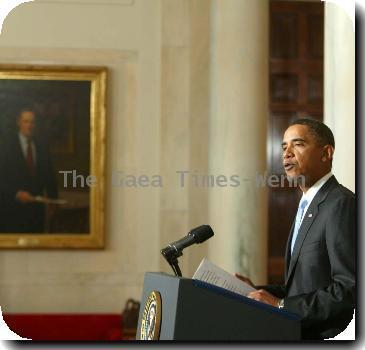Obama hails Iraq vote as an ‘important milestone,’ says millions who voted should be proud
By Steven R. Hurst, APSunday, March 7, 2010
Obama calls Iraq vote an ‘important milestone’
WASHINGTON — President Barack Obama praised the Iraqi people for passing “an important milestone” Sunday, when millions turned out for national elections despite insurgent attacks that killed more than 30 people.
No doubt relieved that violence was not worse, Obama said Iraqi security forces showed maturing capabilities as they protected the nation through a day that was ripe for attacks by Sunni Muslim insurgents and al-Qaida in Iraq.
“Today’s voting makes it clear that the future of Iraq belongs to the people of Iraq,” the president said.
The vote was Iraq’s second national election since the U.S.-led invasion in 2003. The big turnout and limited violence were seen as key to the planned withdrawal of American combat forces by Aug. 31.
Obama again vowed to meet that deadline and to carry through with the subsequent removal of all the remaining 50,000 U.S. troops by the end of next year. There are now fewer than 100,000 American forces in the country, the smallest number since the overthrow of Saddam Hussein.
In the last election, in 2005, Sunnis largely boycotted the vote. Before a new government could be formed, an important Shiite mosque was bombed in Samara, setting in motion two years of sectarian bloodshed that took the country to the verge of civil war.
“By any measure this was an important milestone in Iraqi history,” Obama said. “In a strong turnout, millions of Iraqis exercised their right to vote with enthusiasm and optimism.”
Secretary of State Hillary Rodham Clinton said Sunday’s voting was a “rebuke to the violent extremists who seek to derail Iraq’s progress.”
“Our thoughts and prayers are with the families who lost friends and loved ones, and we salute the determination of the Iraqi people to reaffirm their commitment to democracy,” she said in a statement.
U.S. Iraq commander Gen. Ray Odierno discounted the violence. In an unclassified report obtained by The Associated Press, he said “I believe we had only 3-4 significant events” countrywide.
He said security measures had forced insurgents to switch tactics, forgoing car and suicide bombings altogether.
Odierno had high praise for Iraqi forces, saying they “performed superbly today. They passed this test with flying colors and provided a security environment in which Iraqis could safely cast their votes.”
Obama had warm words for Americans who now serve in Iraq and the hundreds of thousands who have fought through dark days in the country, calling the vote “a tribute to all who have served and sacrificed in Iraq over the last seven years, including many who have given their lives.”
Obama spoke briefly in the Rose Garden after having issued a statement earlier in the day declaring his “respect for the millions of Iraqis who refused to be deterred by acts of violence, and who exercised their right to vote today.”
Defense Secretary Robert Gates said, “All in all, a good day for the Iraqis and for all of us.”
American officials have said they expect it will take months for the new parliament — once the vote outcome is known — to select the next prime minister who will then choose the new government. The White House has acknowledged the possibility of continuing violence during that period.
Prime Minister Nouri al-Maliki was fighting for his political future with challenges from a coalition of mainly Shiite religious groups on one side and a secular alliance combining Shiites and Sunnis on the other.
The election was seen as a crossroads where Iraq will decide whether to adhere to politics along the Shiite, Sunni and Kurdish lines or move away from the ethnic and sectarian tensions that have emerged since the fall of Saddam’s iron-fisted, Sunni-minority rule.
Al-Maliki, who has built his reputation as the man who restored order to the country, faced strong challenges from his former Shiite allies, the Supreme Islamic Iraqi Council and a party headed by anti-American cleric Muqtada al-Sadr.
He also was standing against a secular alliance led by Ayad Allawi, a former prime minister and secular Shiite, who has teamed up with a number of Sunnis in a bid to claim the government.
AP National Security Writer Anne Gearan and AP writer Natasha Metzler contributed to this report.
Tags: Barack Obama, Iraq, Middle East, North America, Religious Issues, United States, Washington





